Brazen House Guests Tell Host She Should Temporarily Move Her Husband's Service Dog Because It Makes Their Daughter Uncomfortable
Service dogs are not like any typical dog you can pick up from the pound. They are animals that are specifically trained to aid persons with disabilities.
They are integral to the lives of the people they are trained to help. Their skills are geared towards helping a person with a disability live more independently.
You cannot just bend down and pet a service dog when you encounter them and their human. They are working dogs whose focus should only be on their human companion.
This is why this story on Reddit is so baffling. OP's husband has a disability, and he recently got a service dog.
The dog is not the only new addition to their home, as they are currently housing OP's brother and his family. They asked to stay with them after losing their home and promised this was only temporary.
Things were going well until OP's 14-year-old niece began complaining about the service dog. Apparently, it made her uncomfortable, though she did not specify how.
OP's brother asked her if they could move the dog, but OP said no. Her husband's service dog is helpful, smart, and he's too busy performing his job to bother anyone.
Their house guests told OP that her husband doesn't need the dog anyway since he stays home most of the time. They even tried negotiating with OP's husband directly, but OP shut them down every time.
Her brother's wife argued with OP the moment OP's brother was out of the house

She accused OP of prioritizing the service dog over her own niece, and they continued arguing until her brother got home from work
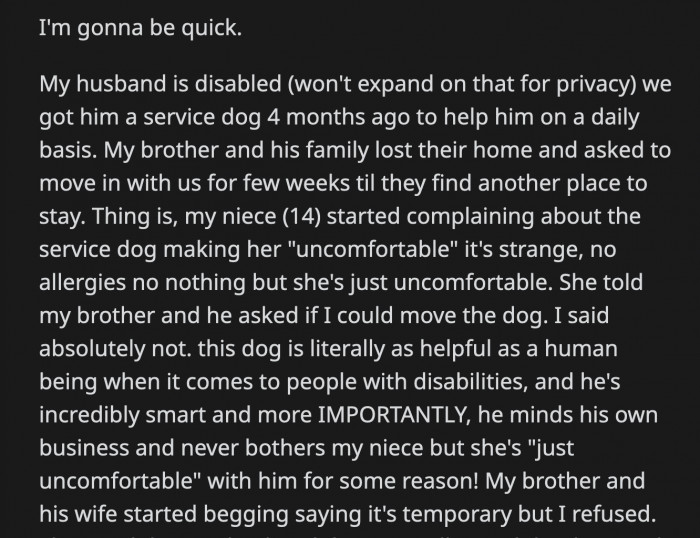
OP said the dog was not an ordinary animal and that her husband needs him. OP's husband asked her to take him and the dog to his father's house to avoid further arguments with her brother, but OP said no.

Navigating Family Dynamics with Service Animals
This situation highlights the complexities of family dynamics when service animals are involved.
Dr. Michelle Roberts, a psychologist specializing in disability and inclusion, notes that service animals play critical roles in their owners' lives, providing emotional and physical support.
Research shows that individuals with service animals often face misunderstandings from others, particularly regarding their needs and the importance of their animals.
Boundaries and Emotional Comfort
The request to move a service dog highlights the complexities of boundaries and emotional comfort in social interactions. According to research in social psychology, establishing clear boundaries is crucial for maintaining healthy relationships. Individuals often expect their needs and comfort levels to be respected, but this can lead to conflicts when those boundaries clash.
In this scenario, the discomfort expressed by the brazen guests can be viewed through the lens of entitlement, where they expect adjustments to be made for their comfort without acknowledging the needs of others.
Her brother and his family are now ignoring OP while her husband is still convincing her to take him to his father's house. Did OP's refusal to compromise make her an a**hole?
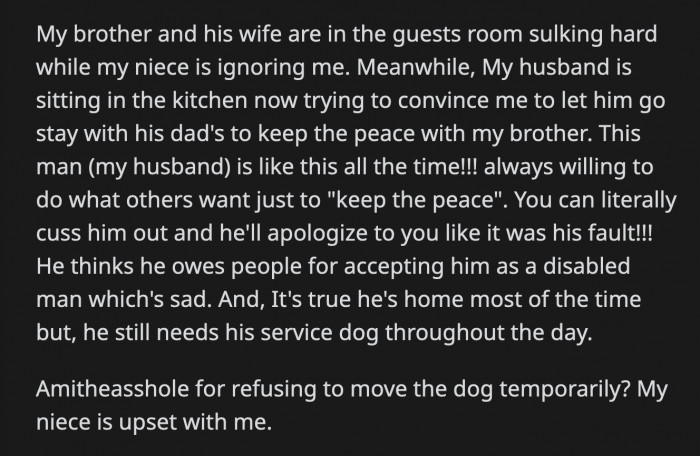
OP and her husband generously opened their home to them when they most needed it, and this is how they treat them?

Her husband's dad sounds like a peach. Maybe OP should introduce him to her brother and his family.

The request to temporarily relocate a service dog reflects a lack of understanding of the critical role these animals play in their owners' well-being.
Studies indicate that service animals contribute significantly to their owners' emotional health, and disruptions to their presence can lead to anxiety and distress.
Understanding these dynamics is crucial for fostering empathy and support in family situations involving service animals.
Conflict often arises when differing needs and expectations collide. According to Dr. Alexandra Solomon, a relationship therapist, "Open communication is essential in navigating conflicts, as it fosters understanding and compromise." In this case, the host's response reflects a strong sense of ownership over their space and the emotional needs of their service dog, which should be respected. Engaging in a dialogue about boundaries can help clarify expectations and foster a more respectful environment, as noted by Dr. Ramani Durvasula, who emphasizes that "Setting clear boundaries is crucial for maintaining healthy relationships."
Her reason for wanting the dog out of the house is vague as well. Did she really think she had a compelling reason?

They can find another place where their daughter can be more comfortable.

If she had a real reason for why she can't have the dog around, then maybe some compromise could be reached, but even then, it's still a ridiculous demand to make.
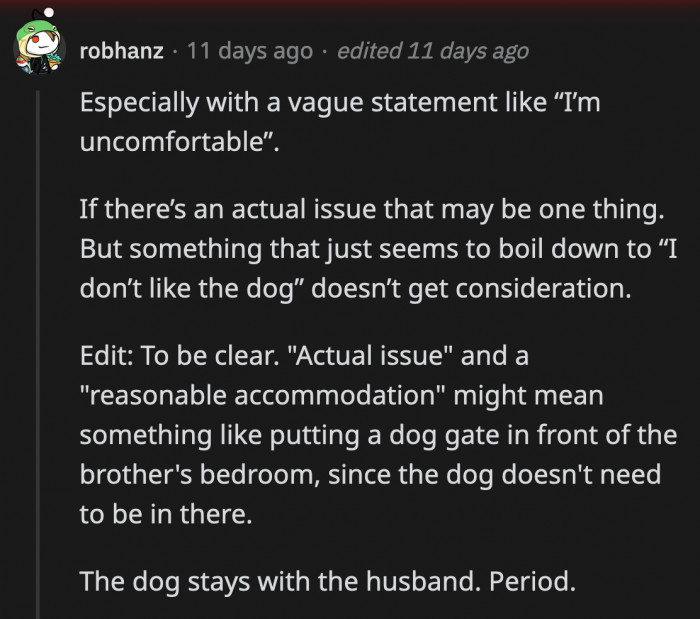
The Importance of Education Regarding Service Animals
Educating family members about the roles of service animals can prevent conflicts and promote understanding.
Experts recommend providing resources and information to help others appreciate the significance of these animals in their owners' lives.
By fostering awareness, families can create supportive environments for both the individual and their service animal.
The Role of Service Animals
Service animals play a crucial role in the lives of individuals with disabilities, providing not just assistance but also emotional support. Research indicates that the presence of service animals can significantly reduce anxiety and improve the quality of life for their owners. This underscores the importance of respecting the needs of both the service animal and its owner.
Understanding the significance of service animals can foster empathy and support for individuals who rely on them.
It sounds like a them problem, to be frank.
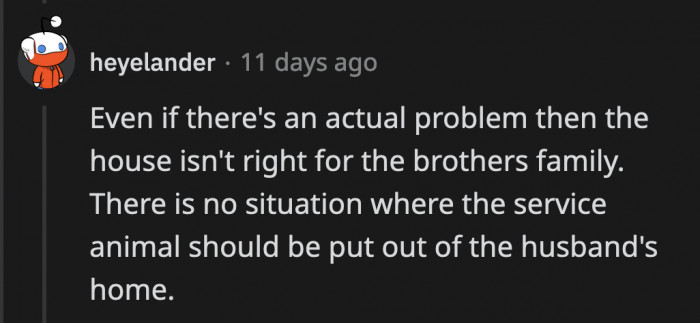
This is the solution: it's not the dog that should move, it's the brother's family.
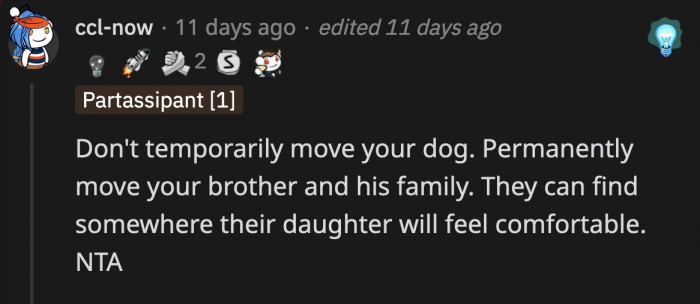
The sooner they are out of the house, the better it will be for OP's own family.

Practical strategies for addressing discomfort around service animals include open discussions about feelings and concerns.
Experts suggest that family members engage in dialogues to express their feelings while also learning about the service dog's purpose and training.
This approach can help bridge the gap between understanding and acceptance, leading to healthier interactions.
To navigate similar situations, it may be beneficial for hosts to establish clear policies regarding guests and service animals. Communicating these policies ahead of time can help set expectations and prevent discomfort for all parties involved.
Additionally, engaging in discussions about the importance of service animals can promote understanding and respect among guests.
Even if the dog wasn't a service animal, I would still be very reluctant to kick him out of his home because a house guest can't cope.

It's like a terrible version of Modern Family.

They probably understand, but they don't think the dog is that important to OP's husband.

Empathy and Inclusion in Family Relationships
Empathy is a crucial component of inclusion, particularly in family settings involving service animals.
Research indicates that cultivating empathy can lead to more supportive environments for individuals with disabilities and their support animals.
By fostering a culture of inclusion, families can reduce misunderstandings and strengthen their relationships.
Emotional Intelligence and Social Interactions
Emotional intelligence plays a significant role in social interactions, particularly when navigating conflicts. Research shows that individuals with high emotional intelligence can better understand and manage their emotions, as well as empathize with the feelings of others. This can be particularly helpful in resolving conflicts around boundaries and expectations.
Encouraging guests to consider the emotional needs of others can foster a more harmonious atmosphere in social situations.
She's just 14 years old, and she's already this entitled? Incredible.
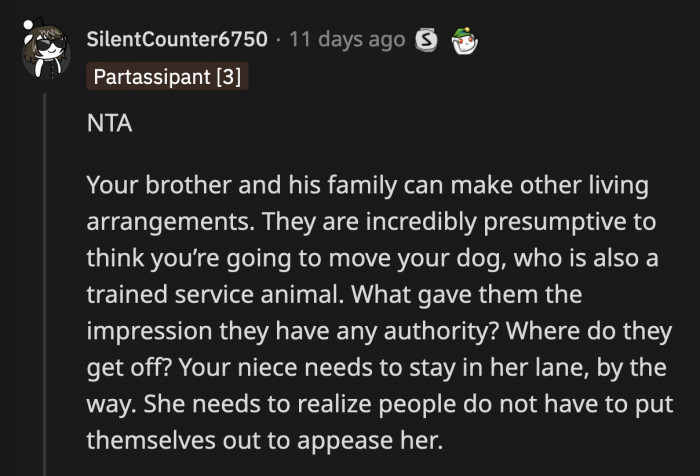
OP has to kick them out of the house as soon as possible before they come up with other favors to ask of her.

The audacity of some people is mind-boggling.
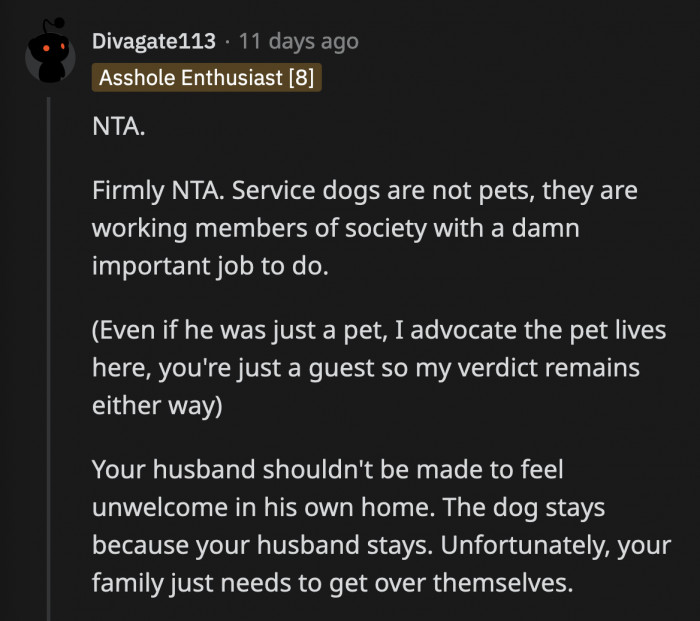
Thank you. Next!

How inconsiderate and unfeeling do you have to be to ask someone to kick out their service dog because you don't like it? Who in their right mind would think this was an okay thing to say to someone they already owe so much to?
OP, her husband, and his service dog will be better off without these people in their home. They have overstayed their welcome, and it's about time they find a more comfortable place to live.
Psychological Analysis
This situation reveals the complexities of social dynamics, particularly when needs conflict. It's important for individuals to recognize that service animals play a vital role in their owners' lives and deserve respect. Open communication about boundaries can help foster a more understanding environment for everyone involved.
Analysis generated by AI
Analysis & Alternative Approaches
Navigating social dynamics involving service animals requires empathy, understanding, and clear communication. Research indicates that establishing boundaries and respecting individual needs is essential for maintaining healthy relationships.
By emphasizing the importance of emotional intelligence and open dialogue, hosts and guests can create a supportive environment that accommodates everyone involved.
Analysis & Alternative Approaches
This case highlights the complexities of family dynamics when service animals are involved, emphasizing the need for understanding and empathy.
As noted in psychological literature, fostering supportive environments can significantly enhance the well-being of both individuals and their service animals.



